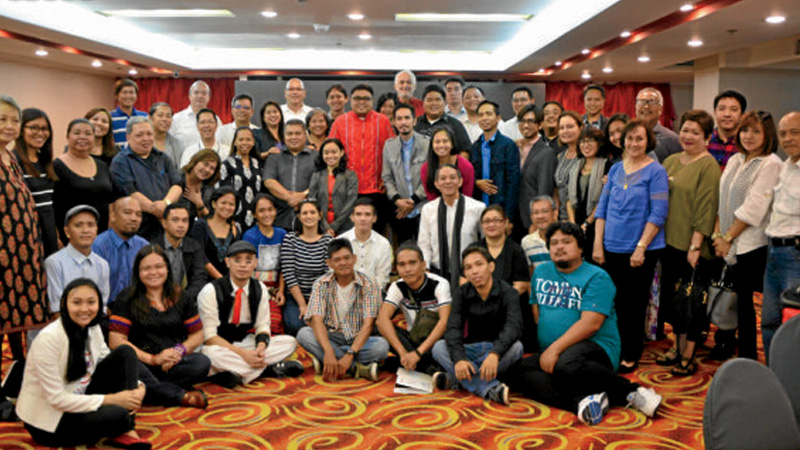
MOVIE SECTOR’S AGENDA Movie industry representatives who attended the National Development Meeting for the Arts Summit on Sept. 5 at the Bayview Park Hotel put “distribution” on top of a wish list they would like the President to address with dispatch. Those from other art forms—music, theater, dance and the visual arts—drafted their own lists. CONTRIBUTED PHOTO
Just in time for President Duterte’s first 100 days in office, movie industry insiders have made a simple request for the Chief Executive’s quick action—for Filipino indie films.
Although Filipino indie films continue to win awards in the world’s top festivals in Berlin, Venice and Cannes, gaining the support of local audiences remains elusive.
Local indie films still struggle to find an audience—with most movies suffering the “first day-last day” fate. It is not uncommon for Filipino indie films to be pulled out of cineplexes a day or two after its opening.
During the National Development Meeting for the Arts Summit on Sept. 5 at the Bayview Park Hotel, movie industry representatives put “distribution” on top of a wish list they would like the President to address with dispatch.
Representatives of other art forms—music, theater, dance and the visual arts—likewise drafted their own wish lists. The summit was organized by playwright-musician Njel de Mesa.
Moira Lang, scriptwriter-producer and a member of the executive committee of the Metro Manila Film Festival, summed up the industry’s No. 1 aspiration—the adequate and effective distribution and promotion of independent Filipino movies in the country.
Vincent Nebrida, who represented the film production outfit Tuko, Buchi Boy and Artikulo Uno (or TBA, producers of the surprise hit movie “Heneral Luna”), told the Inquirer that after a spirited, daylong discussion, “distribution” emerged as a top concern among movie industry representatives, who included filmmakers Paolo Villaluna and Emman de la Cruz, and actresses Mae Paner and Liza Diño.
It was suggested that “cinemas that have more than six screens per mall [should] assign one screen dedicated exclusively to playing Filipino movies the whole year.”
The proposal is similar to Executive Order No. 255, signed in 1987, which requires local
radio stations to play a minimum of four Filipino songs per hour, pointed out Nebrida, president of TBA.
Full 7-day run
To address the “first day-last day” syndrome, Nebrida said summit participants recommended that films “have a guaranteed full seven-day … run, regardless of the box-office results.”
Nebrida recalled that “Heneral Luna” had lost many of its theaters on its first weekend, but was able to recover them in its second week, after becoming a sleeper hit through word-of-mouth and fan support in social media.
Filipino films should be given a fighting chance in the theaters, the movie folk asserted.
In connection with guaranteed screenings, it was also proposed that the opening day be moved from Wednesday to Friday.
“In the 1970s and 1980s, local movies opened on a Friday,” Nebrida recounted. At the time, the movies of Fernando Poe Jr. and Sharon Cuneta easily clobbered Hollywood flicks at the tills.
In the mid-1990s, the dominant players decided to move the opening day to Wednesday, to give local movies a head start. But Hollywood followed suit.
Now, the situation is reversed with Hollywood movies trouncing Filipino movies at the box office, week in and week out.
“Filipino filmmakers should not be treated like second-class citizens in their own country,” Nebrida said.
To help the local movie industry mature, it is imperative to come up with a “transparent” and objective disclosure of the box-office results of all films, according to the movie industry representatives.
Another suggestion involved TV networks, which should be required to “allot air time for advocacy and cultural ads, including teasers and trailers.”
Legislation
If all else fails and industry stakeholders still choose to turn a blind eye to these issues, legislation can undoubtedly help in implementing the summit suggestions, Nebrida noted.
Liza Diño, who was appointed by President Duterte to head the Film Development Council of the Philippines (or FDCP, the government body mandated to take care of the movie industry), told the Inquirer that the agency was already acting on the wish list.
“We are pursuing half of the wish list,” she said. “We are exploring protectionist policies and our technical consultants are putting together MOAs (memorandum of agreements) with the respective agencies involved.”
The FDCP expanded the wish list into a “cinema agenda.”
Foremost on the agenda is the creation of a National Film Commission that would “streamline the functions of various film-related agencies, like the Movie and Television Review and Classification Board, the Optical Media Board, the Film Academy of the Philippines, the National Commission for Culture and the Arts, and FDCP.
Department of Culture
Part of the agenda is the need to establish a Department of Culture, so that cultural concerns, including the welfare of film and entertainment workers, can be discussed at Cabinet meetings.
The agenda underlined the urgency of declaring the people who work in the movies and in television workers, who shall be accorded specific rights and other benefits, including a welfare system, security of tenure and rational work hours.
“Entertainment should be classified as an industry by the Department of Labor and Employment,” she said.

